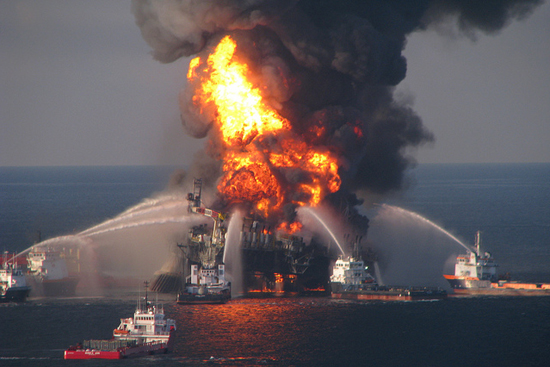BP Oil Spill One Year Later
BU prof on oil, nature, and how money always wins

Today marks the first anniversary of the Deepwater Horizon disaster, which turned an offshore oil rig into a fireball, killed 11 workers, and eventually dumped five million barrels of oil into the Gulf of Mexico.
The environmental catastrophe, the largest marine oil spill in history, played out in a daily drama over the course of the spring and summer, with images of oil-drenched pelicans and creeping ochre slicks filling nightly newscasts. BP, the principal developer of the oil field, made several attempts to cap the gushing well before finally succeeding 86 long days after the blast.
In the wake of the spill, President Barack Obama issued a moratorium on deepwater drilling and established new safety standards, but the U.S. District Court in New Orleans later issued an injunction on his order, citing the economic harm to the region’s workers and businesses. Drilling has since resumed in the gulf, although on a much smaller scale.
Cutler Cleveland, a College of Arts & Sciences professor of geography and environment, a research fellow at the Pardee Center for the Study of the Longer-Range Future, and editor of the Encyclopedia of Earth, a Wikipedia-like ecological resource with strict quality control, has tracked the Gulf of Mexico spill since its early days and compiled a trove of documents on the site under a new project called OCEAN-OIL (Online Clearinghouse for Education and Networking—Oil Interdisciplinary Learning).
Reflecting on the Deepwater Horizon disaster on its anniversary, BU Today contacted Cleveland to discuss OCEAN-OIL (O-O).
BU Today: When did you decide to start compiling information about the Deepwater Horizon oil spill and posting it on OCEAN-OIL?
Cleveland: The initial estimates from BP and the government suggested a modest spill. But about a week into the disaster, estimates were made by scientists in academia and independent research institutes. These estimates of the magnitude of the spill were many times higher than the official government estimates, and they appeared to be based on sound methodologies. It quickly became clear that this was going to be a very significant event, one that needed to be thoroughly documented.
What do you and your collaborators hope to achieve through O-O?
The goal of O-O is to collect and organize the most authoritative information about the Deepwater Horizon disaster and make it available to students, teachers, the media, decision-makers, and the public at large.
On the site, you describe the Gulf of Mexico disaster as a “teachable moment.” What can we learn about deepwater drilling in places like the gulf?
The steady march to deeper and deeper waters has outpaced our understanding of the risks associated with deepwater drilling, as well as the capacity of federal regulators to develop effective oversight. The disaster also demonstrated that our appetite for energy—and the lifestyles it supports—comes at great expense to the natural environments that sustain the planet.
Has the U.S. government reacted too hastily by allowing drilling to resume?
The federal government had no choice. Oil and gas activity is the lifeblood of the coastal state economies, employing tens of thousands of people and generating substantial tax revenue. Combined with the interests of the oil industry, this created enormous pressure to lift the drilling moratorium.
What precautions do the government and the oil industry have to take to make deepwater drilling a safer operation?
The revolving door between the oil industry and the government regulatory agencies must close. We need regulation that is independent of industry interests and in line with the public interest.
Do you think the attitudes and actions of Americans have changed much regarding oil consumption since last year’s spill?
Not really. Disasters like Deepwater Horizon don’t seem to have a lasting impact on our oil consumption habits. The only thing that will change those habits is an increase in oil prices that is large and permanent.
Will the United States forever be dependent on oil, or do you think there is a realistic alternative to meet all of the nation’s energy needs?
We will use oil until its costs outweigh its benefits. Alternatives to oil—ethanol, oil shale, coal-to-liquids—are all more expensive than oil, and so oil continues to be the fuel of choice, despite the large risks associated with it.
Leslie Friday can be reached at lfriday@bu.edu; follow her on Twitter at @lesliefriday.
Comments & Discussion
Boston University moderates comments to facilitate an informed, substantive, civil conversation. Abusive, profane, self-promotional, misleading, incoherent or off-topic comments will be rejected. Moderators are staffed during regular business hours (EST) and can only accept comments written in English. Statistics or facts must include a citation or a link to the citation.